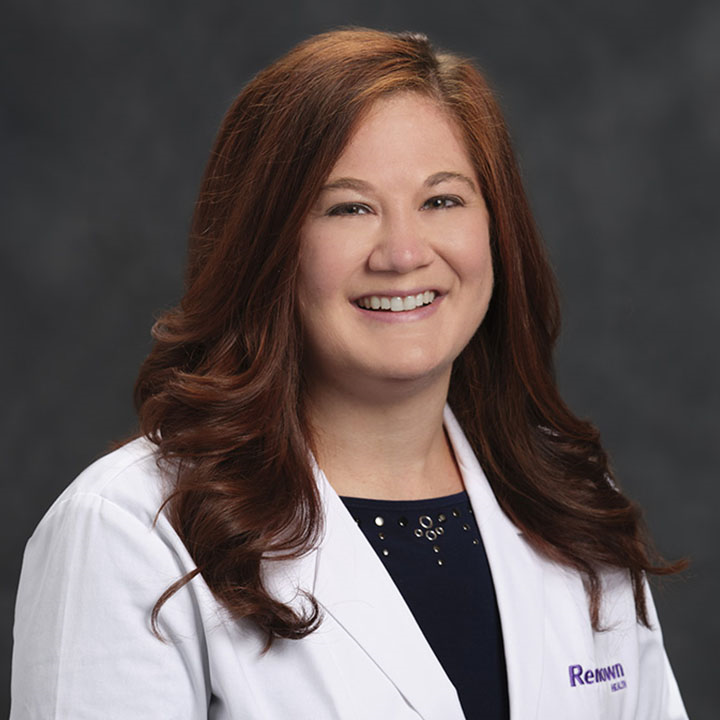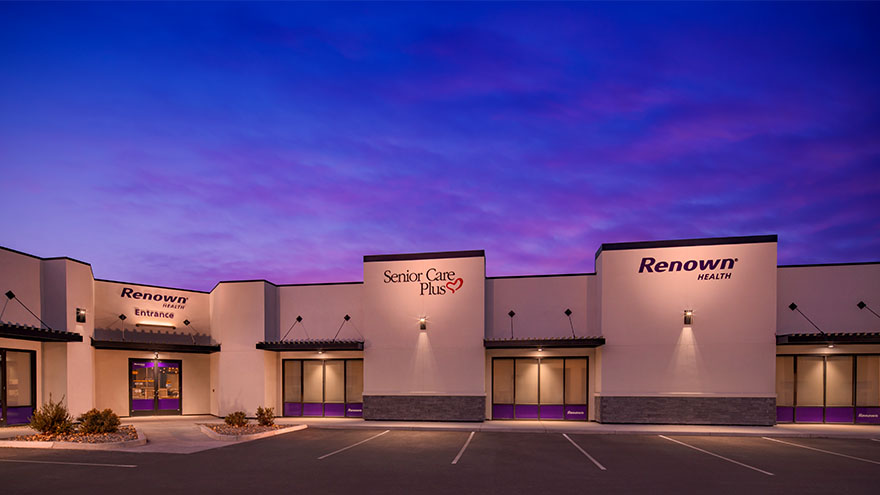Search
Results for 'primary care'
Clear-
What is the Healthy Nevada Project?
The Healthy Nevada Project (HNP) is one of the most visible genomic studies in the United States, and guess what? Renown Health powers it! The Healthy Nevada Project (HNP) aligns with Renown's goal to do the best for our patients. The genomic study is at no-cost for Nevadans and gives participants insight into different genetic traits, including results on three prevalent and serious health conditions known as CDC Tier 1 conditions. CDC Tier 1 Conditions Include: Hereditary Breast and Ovarian Cancer Syndrome (HBOC) Lynch Syndrome Familial Hypercholesterolemia (FH) Not only does HNP give participants insights into their genetic background, but it also facilitates Renown's ability to study population health. Research lays the foundation for the future of medicine, and Renown's HNP is on the cutting edge of genetic research. We do this by providing skilled researchers access to studies for the diseases that currently have limited treatment, including nonalcoholic steatohepatitis liver disease or NASH. For example, the observational NASH study helps researchers understand genetic links to the disease. Make an Appointment to Get Screened If you haven't already, join the over 55,000 HNP participants and make an appointment to have yourself screened. You can schedule a screening appointment through MyChart. Click “Schedule an Appointment" and select Research Appointment - Genetic Screening. Prior to your appointment, please complete e-Check-in and complete your consent form.
-
Understanding Your Risks for Fatty Liver Disease
Did you know that about one in four adults and one out of every ten kids in the U.S. might have a liver problem called non-alcoholic fatty liver disease (NAFLD)? This happens when too much fat builds up in the liver, and it's not because of drinking alcohol. The most serious type of this liver problem is called metabolic and non-alcoholic steatohepatitis (M/NASH). It means there's damage and can be scarring in the liver. About 20% of people with fatty liver disease have M/NASH. What's worrying is that many people don't even know they have it. Dr. Catherine McCarthy, a family medicine doctor at the University of Nevada, Reno School of Medicine, talks about the main risks of M/NASH and how you can check your risk for liver disease during Liver Health Matters Month, or anytime. Who Might Get M/NASH? Doctors aren't sure exactly why some people get fatty liver or M/NASH. While anyone can get M/NASH, people who might be more at risk include those with: Type 2 diabetes Insulin resistance or prediabetes High body mass index (BMI) or obesity High cholesterol or other fats in the blood High blood pressure Signs of liver problems from tests or biopsies A family member living with M/NASH How Do Doctors Find Out If You Have M/NASH? Doctors can do different checks and tests to see if someone has fatty liver or M/NASH. They might look at your liver health through non-invasive tests such as blood work, ultrasounds or MRIs. They might also suggest a special blood test called an Enhanced Liver Fibrosis (ELF) test– offered at no-cost through the Healthy Nevada Project – to check your risks of advancing liver disease. How Can You Treat Fatty Liver Disease or M/NASH? Patients with moderate to advanced liver scarring may also be prescribed a recently approved therapy called Rezdiffra. However, prevention of advancing disease is still the best option. Actions you can take to improve your liver health and reduce your risk include: Eating healthy, especially low-carb foods Exercising regularly Losing weight if needed Not drinking alcohol Keeping an eye on blood sugar if you have diabetes No-Cost Liver Screening Through the Healthy Nevada Project If you live in Nevada and are 18 or older, you can qualify for a no-cost liver health screening by enrolling in the Healthy Nevada Project, one of the largest community-based population health studies in the entire country. This study helps doctors understand your liver health better and plan early treatments to stop liver disease from getting worse. By joining the Healthy Nevada Project, you can: Get the FDA-approved ELF test to check your risks for liver disease See your test results in your medical record to help your doctor plan your care better Help doctors and researchers learn more about M/NASH and work on future treatments Participate in genetic sequencing for high-risk conditions linked to heart disease and certain cancers, including breast and ovarian cancer Gain high-level health insights, including food sensitivities, and ancestry information. Enrolling in the study is easy: Schedule a Virtual Consent Appointment through MyChart where a study representative will answer any questions, confirm your eligibility and sign you up. Once you’re signed up, your representative will schedule your blood test. Go to your blood draw appointment. By taking part in this study, you're helping to make a difference in liver health research!
Read More About Understanding Your Risks for Fatty Liver Disease
-
Why Am I So Tired? 9 Reasons for Your Chronic Exhaustion
Do you find yourself struggling to stay awake during the day or having no energy? You’re not alone. Whether you’re a full-time employee, a student or retiree, that “I’m tired” feeling comes in all shapes and sizes. What’s even more frustrating is not knowing the source of your exhaustion. Dr. Brandon Flores, a sleep medicine physician with Renown Medical Group, breaks down nine key reasons why you may be feeling so fatigued. You did not get enough sleep, or your quality of sleep is poor. This may seem obvious, but in today’s “rise and grind” culture, sleep can be considered a luxury rather than what it really is: a necessity. Ensuring you get adequate hours of sleep between 6-9 hours and quality sleep is essential. You may not be breathing well during sleep. Interruptions to your breathing, such as snoring, can decrease airflow at night causing your sleep to be less restorative. This is often due to Obstructive Sleep Apnea (OSA). OSA can lead to daytime fatigue and sleepiness and can also impact other chronic health conditions, such as hypertension, diabetes, acid reflux, migraines and heart rhythm. You are not getting enough regular exercise, or you are exercising too much. Incorporating at least 30 minutes a day of physical activity can help keep you energized throughout the day. It has also been shown to increase deep slow wave sleep, which is often associated with feeling rested. On the other hand, getting too much exercise can tire you out more easily and heighten stress levels. You drink too much caffeine. This one may seem counterintuitive – caffeine is supposed to keep you awake, right? Well, overdoing it with your favorite coffee or soda could affect your sleep quality. Pay attention to your caffeine limits and have a cut-off time, as most caffeine should not be consumed past noon. You have a food allergy or intolerance. If you find yourself feeling especially tired after eating a lot of a certain food, you could have an allergy or intolerance to it – and vice versa. Consider speaking with your primary care provider (PCP) about a food allergy test or being referred to an allergist. You’re drinking too many alcoholic beverages. Alcohol is a depressant, which as the word implies, can make you feel especially tired during the day. It can also affect your breathing at night and disrupt your sleep cycle. Cutting back on alcoholic drinks may be beneficial to your overall health. You are anemic. This is the leading cause of fatigue in women but can affect people of all genders. It can be associated with low iron. Eating foods high in iron, including leafy greens and many different meats, can help your iron levels. A blood test ordered by your PCP can help you understand if you are iron deficient. You are experiencing depression or anxiety. Emotional exhaustion can be just as taxing as physical exhaustion. Prolonged feelings of sadness, hopelessness, nervousness or panic can be signs and symptoms of depression or anxiety. Speak with your provider about the many resources available to help you. You have an underactive thyroid. Feeling fatigued can also be a symptom of hypothyroidism, which affects your metabolism and energy levels. Medication can help get your thyroid back to normal. Your PCP can order a blood test to determine your thyroid levels. If you experience severe exhaustion that lasts six months or longer, worsens after physical or mental exertion and does not get better after resting, it could be a sign of myalgic encephalomyelitis, otherwise known as chronic fatigue syndrome (CFS). This is a diagnosis of exclusion, and other causes must be ruled out. While there are no tests that detect CFS, your provider can order blood and urine tests to rule out other causes of your fatigue and help develop a care plan. © Africa Images via Canva.com
Read More About Why Am I So Tired? 9 Reasons for Your Chronic Exhaustion
-
Physician_Premier Care
Full Time - Eligible for Benefits510701 AdministrationDay -
 Samuel Lee, MDSamuel Lee, MDRenown UNR Primary Care, Infectious Disease and Dermatology - Plumas
Samuel Lee, MDSamuel Lee, MDRenown UNR Primary Care, Infectious Disease and Dermatology - Plumas -
Nurse Practitioner_Urgent Care
Full Time - Eligible for Benefits510701 AdministrationDay -
Nurturing Your Child's Back-to-School Mental Health
The back-to-school season is here, and ensuring your child's successful transition involves more than just school supplies and schedules. At Renown Children’s Hospital, and in collaboration with Nevada Pediatric Psychiatry Solutions, we understand the vital role that mental health plays in a child's overall well-being and academic performance. Below we'll guide you through essential tips for a smooth back-to-school experience, with a special focus on nurturing your child's mental health. How to Support Your Child’s Mental Health from Home Remember, the below strategies can be adapted to align with your child's personality, learning style and household dynamics. Flexibility and understanding are key in tailoring these tips to suit your child's unique needs. 1. Be Open to Communication: Recognize that effective communication is the cornerstone of understanding your child's feelings and concerns. Create a safe space where your child feels comfortable expressing their thoughts. Listen to learn, without judgment. Make it a point to validate their emotions and ensure they are heard. Encourage sharing experiences,worries, friends and challenges they may be facing. Having open conversations about sensitive topics opens the door for discussion and understanding. Make yourself available. 2. Establish a Routine: A consistent routine can offer a sense of stability and predictability for your child, and anticipation helps to decrease anxiety and establish a sense of control. Join forces and design a daily schedule that includes time for schoolwork, play, physical activity, meals and relaxation. Be flexible about the structure to allow room for last-minute changes including extra activities based on that day’s needs as well. Always add time for play and bonding. 3. Practice Compassion: Back-to-school can come with big emotions. Listening reflexively and acknowledging these feelings can help you and your child act positively on these big emotions. 4. Get Involved: Actively engage in your child's school life by participating in school events, meetings and discussions. Show interest in their educational journey, ask about their experiences and provide guidance when needed. Being present in their academic pursuits not only boosts their confidence but also strengthens the parent-child bond. 5. Use Positive Reinforcement: Celebrate your child's achievements, no matter how small they may seem. This allows for a sense of accomplishment and boosts self-esteem. Praise efforts, progress and perseverance, whether it's completing an assignment, making a new friend or overcoming a challenge. This positivity encourages a growth mindset and resilience. 6. Organize a Schoolwork Zone: Create a comfortable workspace at home dedicated to school-related tasks. Customize the area based on your child's preferences and needs. Having a designated space for studying and completing assignments promotes focus, reduces distractions and enhances their overall learning experience.
Read More About Nurturing Your Child's Back-to-School Mental Health
-
A Facility Designed with Seniors in Mind
Did you know that members of Senior Care Plus, the largest Medicare Advantage Plan in northern Nevada, have access to an exclusive, senior-focused Renown Health primary care office right here in Reno? The facility – and the Medicare plan itself – are both designed with seniors in mind; this includes specialty staff, longer appointment times, on-site services, supportive furniture and more. 4 Benefits of an Exclusive Senior Care Plus Facility Centrally Located with Senior-Focused Staff The Senior Care Plus facility, located on Del Monte Lane, is only open to members of Senior Care Plus. This exclusive access means that the bilingual staff – including doctors, medical assistants, nurses and personal assistants – works daily with aging health needs. On-Site Services and Enrollment Specialists The Senior Care Plus providers understand that seniors often require complex care management and geriatric-focused services. That is why this location offers on-site lab draws, saving travel time and stress. Another essential service this location offers is longer appointment times, ensuring members don’t feel rushed when discussing their health needs with providers. Another perk of the Del Monte location – on-site enrollment specialists. Members, and potential members, can stop by this location on weekdays between 9 a.m. and 4 p.m. to have their SCP-related questions answered. Furniture Designed with Seniors in Mind Senior Care Plus makes a doctor visit as stress-free as possible. The office has furniture that makes each visit more comfortable for members. All of the office chairs have armrests, so seniors can easily get in and out of them. Also helpful are the exam room chairs with remote controls for reclining the chair and lifting the patient’s legs. This makes exams, such as a diabetic foot exam, less of a strain. Community Rooms Social connections are an important part of health. That is why the Del Monte Lane office has community rooms used for informative seminars and as a gathering place for members to mingle. The seminars focus on many interesting topics for older adults, such as diabetes, COPD, asthma, weight loss, nutrition, yoga and chair exercises.








